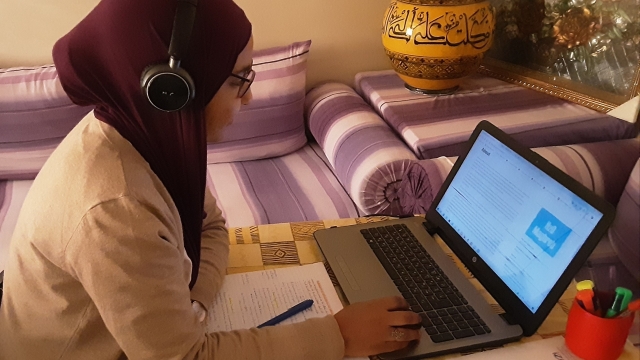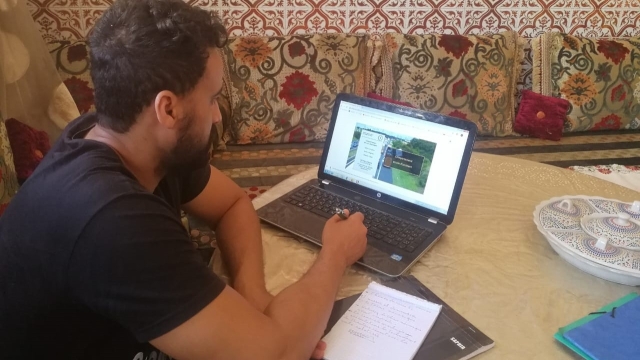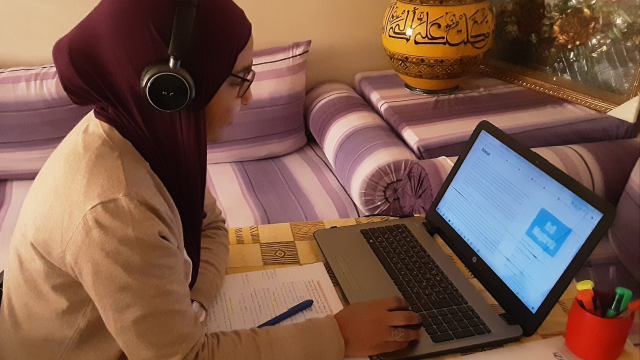By Clara McLinden
Since mid-March 2020, people in Morocco have been operating under strict rules of confinement in order to limit the spread of COVID-19. Schools and non-essential businesses are expected to remain closed at least until the end of May.
The United Nations Industrial Development Organization (UNIDO) is currently implementing two partnership projects in the technical and vocational education and training (TVET) sector in Morocco: ACCES, a specialized truck and bus driver training programme, and H2O Maghreb, a water and wastewater management training programme. With all students, trainers and staff forced to stay at home, UNIDO has been working closely with its partners to explore digital methods to continue the training programmes.
Before the pandemic hit, ACCES was set to begin an inaugural training cycle for the truck driver training programme. Once the COVID-19 measures came into effect, the team realized that the only chance for the programme to begin was to adapt – and quickly. From the way they evaluated the candidates, to how they delivered the training: everything had to be re-imagined for distance learning.
During the pre-selection process, in addition to the standard technical requirements for the training, the team looked for candidates who expressed a motivation to begin their studies from home and a commitment to complete this pre-training phase, as well as the practical training component once the school opens again. The ACCES team launched a remote-based, pre-training programme on a sector-specific e-learning platform for the 16 successful candidates and four trainers.


Thirty-one-year-old Mehdi Mhainina is one of the trainees who is currently benefitting from the pre-training programme. Mhainina sees the virtual programme as an opportunity to build crucial technical and soft skills to help him be better prepared to enter the workforce post-COVID-19. “I am really enjoying taking part in this online pre-training programme, which brings students and trainers together in a virtual classroom,” said Mhainina. Within the last week, trainees and trainers spent over 112 hours collectively covering different modules on the e-learning platform.
The H2O Maghreb project team, in collaboration with the Moroccan National Office of Electricity and Drinking Water (ONEE), also wasted no time in adapting to the new learning arrangements imposed by COVID-19 preventative measures. H2O Maghreb is offering unlimited access to an online training platform, which offers a combination of complementary water and wastewater treatment modules, to 11 trainers and 24 trainees.
Aziza Zerouali, a trainee in the current cohort, says: “Thank you so much H2O Maghreb, I am still just as proud and satisfied as ever with the quality of our training!”
With the team’s rapid response and transition to digital methods, H2O Maghreb managed to avoid any unnecessary lapse in training delivery.
Gilles Paris, TVET expert with the ACCES training programme, said, “With our diverse arsenal of digital tools, such as the e-learning platform and live video sessions, we are able to ensure a high-quality and interactive learning experience for our students, even when it is not possible for us to meet in the classroom. In this challenging context, these tools offer valuable alternatives to our students so they can stay connected and engaged, despite the distance between us.” highlighted ACCES and H2O Maghreb trainers are also providing trainees with additional training courses, covering both technical and soft skills, through interactive live sessions using videoconferencing platforms.
Loubna Benrahmane, a trainer in wastewater management with the H2O Maghreb project, said, “Thanks to these distance learning tools, I am able to clearly explain the principles, methods and objectives of each technical subject,” adding, “I am also sharing videos with my trainees to help them better understand the material, explaining each step as if we were out together doing fieldwork.”
Online training sessions are accessible on any device that can be connected to Wi-Fi, which ensures maximum inclusivity under the circumstances.
A version of the above was originally published by UNIDO’s Learning and Knowledge Development Facility (LKDF).







